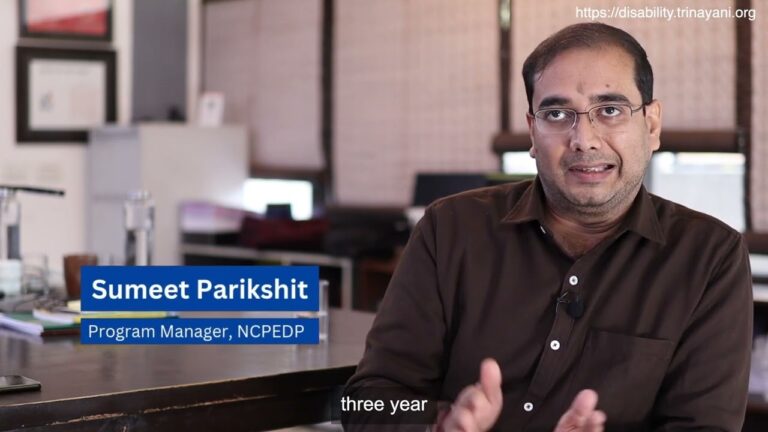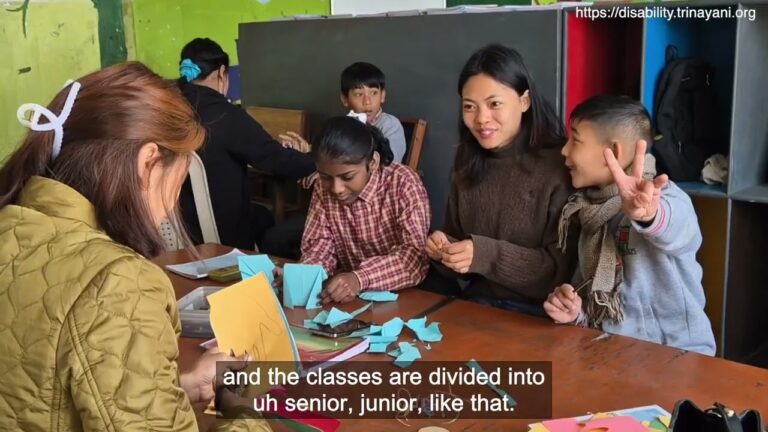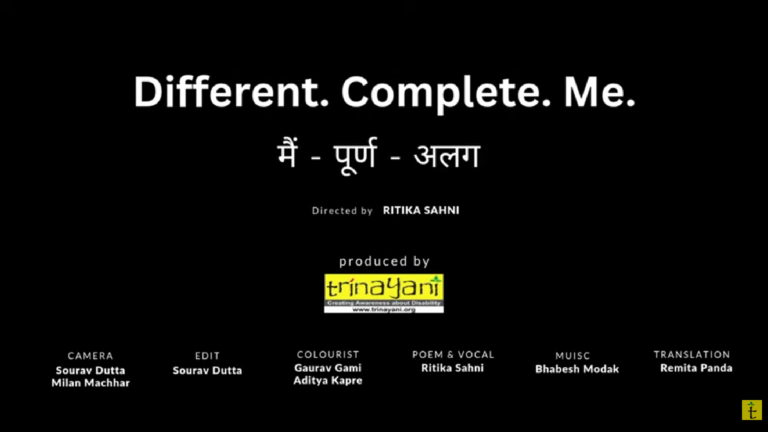Inclusive Music Band – Pehli Baarish
Imagine a world where music is a powerful tool for change, where stereotypes are shattered, and talents shine brighter than anything else.
To bring this imagination to life, Ritika Sahni, the Founder-Trustee of NGO Trinayani and a spirited music performer formed the Inclusive music band called Pehli Baarish with a cadre of her friends. Musicians with and without disabilities perform together in the band, being individuals who can give back to society.
The film shows their journey of performing in different places for different groups, from children with cancer to inmates in jails. Through their music, they challenge misconceptions and create opportunities for conversations around disability to happen. Pehli Baarish is a reminder that everyone, regardless of ability, has something valuable to offer.
You know when anybody thinks of persons with disabilities, or when we talk about people with disabilities, the first thing that comes to our mind is, ‘ah, they need help’.
‘We have to, you know, let’s give them something uh they need to…they need resources’ and that has something which has stayed with me throughout, that why is that the case because as, as the multitude of friends that I have with disabilities, who are engaged in diverse professions, they’re doing so many things…
How come this perception, this stereotype that is there is sticking to this community to peo…to persons with disabilities?
And as a performer myself, as an entertainer myself, what best way to change the perception, I thought, rather than through music?
And that’s when I started speaking to my friends because I also knew friends uh with disabilities who were musicians, who were artists.
So I started a conversation with them that, what is it that we can do that will help us change this perception, of people with disabilities always being in the receiving end, from that perception to people with disabilities who are empowered and who also give back to society?
(Setting up noises.)
(Ritika Sahni singing a Hindi song)
(Ritvik Rajan Kannada song)
They also are citizens who want to give back to societies and are perhaps doing it but you don’t know about it because years and years of, let’s say, films and media portrayal of disability has given you this perception that, ‘they only take, they only…they need something, they don’t give back’, they’re not, they are the receiving end, they’re not giving back.
And that’s when, with the help of a very dear friend of mine, Kishor Gohil, who at the point of time uh ran an organization called National Organization of Disabled Artists, so you actually had an organization called National NODA, National Organization of Disabled Artists…
We got together and we said, that right at first, let’s start, I mean I wanted to start a band and it had to be an inclusive music band, to go well with everything we did at Trinayani, everything has to be inclusive, everything has to have persons with and with…without disabilities as part of the core group.
So, we started Pehli Baarish, and uh, the idea was to perform once a month, for another NGO in the spirit of giving, pro-bono, without asking the NGO to give us remuneration or fee.
We would go and perform for them.
Perform, what they wanted to hear.
So there was an entire, entire schedule that we made, deciding on the time of the show, with proper sound and with a band which had musicians with and without disabilities.
So it was possible to do this because musicians with disabilities also realized that yes, this perception has to change and thought what best way to change that but through this universal language of music.
(Ritvik singing a Kannada song)
(Shafaq singing a hindi song)
(People cheering and talking.)
I love all the people over here.
There are people with disabilities and I mean, it was more than my expectations.
The singing was also very lively.
We, all of us, enjoyed the performance.
It was really mesmerizing for us.
Thank you, thanks for coming and giving a good performance for us.
(Ritika Sahni singing an original song from her self-titled album)
You know after having done so many shows uh at so many places, there are some um experiences that stay with you.
And I would like to, perhaps, share two or three here.
As I mentioned, uh, though Trinayani works uh with and empowering disabled community but Pehli Baarish performs for all kinds of NGOs.
So we performed for children um having cancer.
We performed for old-age homes.
We once got an opportunity to perform in Mumbai at uh the Grant Road Jail, at the Dongri jail for juvenile delinquents.
And it was very interesting because here you had all of them, it was a jail setup, a lot of security, the stage was set up, all of us were there and we could see that here you had uh youth looking at our um disabled friends, perhaps going through that that, ‘oh we’re glad that, you know, we’re not blind’, along with that emotion, they also had this emotion of, ‘oh wow they are blind but they’re going about earning their livelihood by performing, they’re going about giving this joy of music to people’.
And we had so many of these young adults come backstage and speak to our musicians and speak and ask questions and I think that’s what uh an advocacy uh uh initiative should do.
It should allow spaces for conversations to happen.
Our blind musicians present here today can definitely hear you. So if you match your voices to theirs, they’ll feel your approval, and appreciation for their singing, voice and music.
(Shafaq singing a Hindi song)
And that was a very interesting, that was a very interesting uh experience that we had. And I must say here, that it’s not that our disabled musicians were not learning.
For them, it was a great experience.
To actually get into a jail, to actually sit with young adults who were there for various reasons and to talk to them.
So it’s reciprocal, any of these things, very reciprocal.
I could see that even our musicians, even me, you know, we went through all kinds of emotions, so that was a very interesting experience.
Similarly, while in Kolkata, we performed for about 2,500 uh residents of the Dumdum Correctional Centre.
Again, here were these, all kinds of uh gender, ages, and here we were performing.
Uh Kolkata had only blind musicians um along with uh some interesting artists from Kolkata and again it was a very interesting moment of a beautiful give and take where uh the uhm the the the inmates or or the resident would actually wanted to come back and speak to us.
We had to do that, tread carefully, because there was a lot of security, but the very fact that they wanted to come and actually uh touch, just to see that, was this real?
‘Was this, was that person real who actually regaled us with this Arijit Singh song that we so love and here he just came and started the guitar and sang?’
So that was a very interesting experience.
(Ritika, Harshita and Shafaq performing a Hindi song)
Yes yes, yes we’ll be there, thank you so much, thank you so much.
Another show!
You know, irrespective of whether one has a disability or not, we all have unique abilities.
And we all wish to contribute to society, provided we get the opportunities.
So, provide that opportunity.
I’ll wait for your call.
Akkha duniya gol hai, yahan koi nahi aisa soul hai
Jo kabhi nahi huya ho pareshan
Pasina bahayogay, tabhi manzil ko payogay
Ye hai duniya, duniya, duniya meri jaan
Ye hai duniya, duniya, duniya meri jaan
Ye hai duniya, duniya, duniya meri jaan
Thank you so much ladies and gentlemen, thank you so much.
advocacy, blind musicians, community outreach, correctional facilities, disability awareness, empowerment, inclusive music, inclusive performance, musicians with disabilities, NGO, Pehli Baarish, perception change, persons with disabilities, pro-bono performances, reciprocal learning, social contribution, stereotypes, Trinayani, unique abilities, universal language of music
Dive Deeper: More on Disability
Learn about the most common inquiries surrounding disability, education, legislation, accessibility, employment and other sectors related to disability.
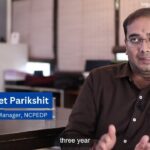
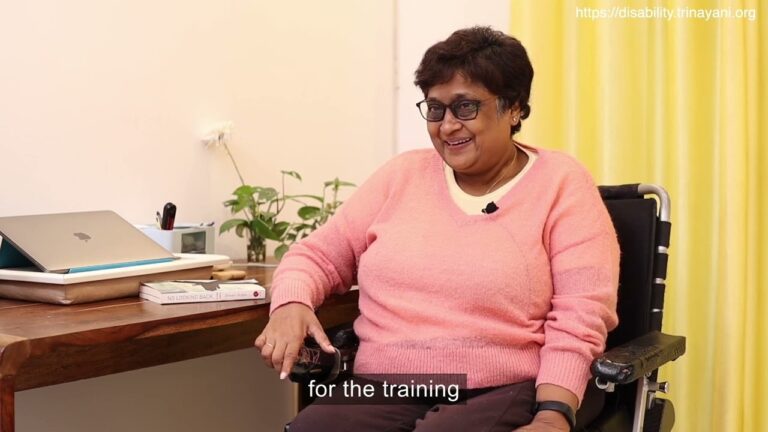
Playlist
Access & Inclusion


Playlist
Adaptive Sports


Playlist
Alternative Communication Methods


Playlist
Autism & Neurodiversity
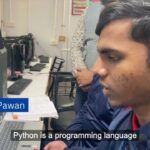
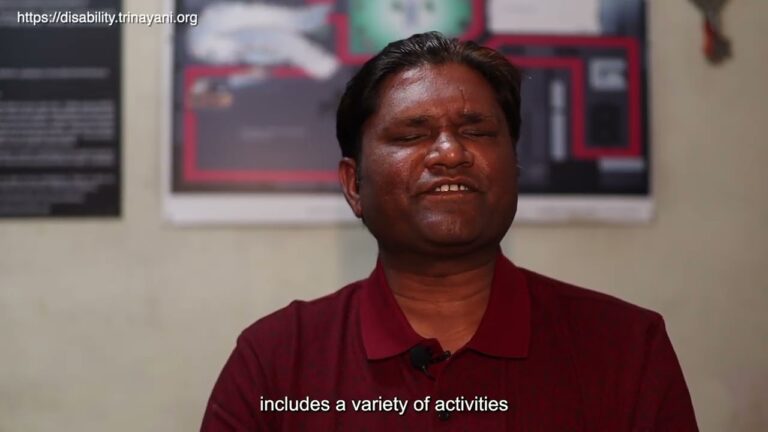
Playlist
Blindness & Adaptations


Playlist


